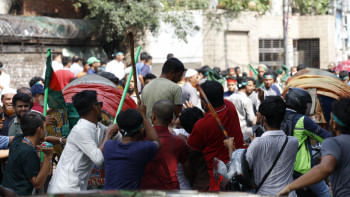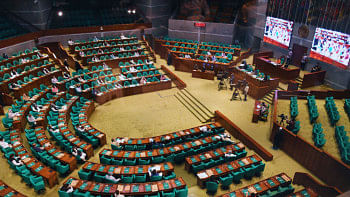We cannot let mobs be the judge, jury and executioner

In recent weeks, Bangladesh has witnessed a terrifying surge in mob justice, exposing both the lawlessness in certain segments of society and the utter failure of the interim government to ensure basic security. This alarming trend reflects the harsh reality of the state of governance in the country and raises questions about our national conscience.
According to media reports, nearly two dozen citizens have fallen victim to mob lynching in the last 40 days alone. However, no visible action has been taken by the relevant authorities in response to these incidents since the interim government took oath on August 8. The brutal lynching of former Bangladesh Chhatra League (BCL) leaders at Jahangirnagar and Rajshahi universities earlier this month, alongside the savage killing of a suspected thief at Dhaka University last night makes it clear that the public has no trust in the country's legal and justice system. These lynched individuals were entitled to the most basic human right: the right to a fair trial, irrespective of their alleged crimes or misconduct. Instead, the mob took over and assumed the roles of judge, jury, and executioner.
The killing of Shamim Ahmed, former organising secretary of the Jahangirnagar University BCL unit, on September 18 is a stark example of this deeply disturbing trend. According to reports, Shamim was allegedly involved in attacking quota reform protesters at Jahangirnagar University on July 15, as well as in criminal activities like drug dealing, land grabbing, and extortion. But does that justify his execution at the hands of students?
Witnesses claim that Shamim was first beaten by a group of students before being "rescued" by university security guards, only to be beaten again—this time in front of those same guards and the university's Proctor. How does such barbarity happen under the supervision of university authorities? Is this the level of security we should expect on our campuses now? What does it say about the character of these students, who brutally attacked a fellow human being, even after he had been taken into custody?
Despite these shocking events, no case has been filed on Shamim's behalf, no one has been arrested at the time of writing this article and the university authorities have done little more than pay lip service to the idea of "investigating" the killing.
The very same night, students of Dhaka University—supposedly the country's best and brightest—killed a man they suspected of being a thief, inside one of the university dorms. As if the act of detaining and beating the man wasn't horrifying enough, demonstrating macabre humour, they offered him food before resuming the beating that eventually claimed his life. This makes one wonder if these students are the future leaders of our country—the "brightest minds" of Bangladesh! It is horrifying to think that this kind of cold brutality exists among students, some of whom were recently hailed as heroes for standing up to an autocratic government.
And yet, this isn't an isolated case. A few weeks earlier on September 7, a mob beat Abdullah Al Masud, another former BCL leader, to death while he was buying medicine from a shop adjacent to Rajshahi University for his newborn daughter. Masud was physically disabled and had been using a prosthetic leg since a political attack on him in 2014. The September 7 attackers knew that Masud was physically not able to defend himself, yet they showed no mercy. Masud was handed over to the police, but he died en route to the hospital.
In all of these cases, the victims were denied due process. The failure of our legal and judicial system over the last several decades to apprehend and penalise alleged criminals is now being exploited by mobs. Plus, almost all regimes in Bangladesh have been unable—and at times unwilling—to address these issues, only fuelling the public's growing sense that mob justice is acceptable.
It is not just this interim government; the previous government, despite being in power for over 15 years, also did little to bring the perpetrators of mob killings to justice. According to Ain o Salish Kendra (ASK), a total of 32 people died in mob beatings between January and June this year. Last year, 51 people were killed in mob lynching incidents, 36 people were killed in 2022, and 28 in 2021. Even when perpetrators of mob violence were identified, arrested and sentenced, the punishment was not finally meted out as witnessed in Abrar Fahad's fatal lynching case.
What is most disturbing about the current mob violence is that the perpetrators come from the same student community, that just two months ago risked their lives fighting against the Sheikh Hasina-led government, toppling it with the promise of a fairer Bangladesh. Worryingly, the inaction of the interim government has not only encouraged these mobs but has also created a toxic environment where such acts of violence are apparently tolerated. The lack of visible legal consequences for these heinous acts sends a dangerous message: that the rule of law is dead, and mob violence is the new normal.
If these incidents are allowed to go unpunished, the rule of law will become nothing more than a hollow phrase. And the Bangladesh we envisioned—where justice is served in courts, not on the streets—will disappear before our eyes. The interim government must stop hiding behind hollow promises of "investigations" and take decisive action. Transparent inquiries into all recent mob killings must begin immediately, and the perpetrators must face swift and severe legal consequences. Furthermore, the government must restore faith in the judiciary by ensuring timely, fair trials for all. It's not enough to promise reform; they must make it clear that mob violence will not be tolerated.
We cannot afford to let this descent into lawlessness define our nation. Bangladesh fought hard for its democracy, and just a month ago, a thousand people gave their lives to restore it. Now it appears that the dream of justice is slipping away, with blood being shed in the name of mob vengeance. If this interim government fails to deliver justice, the consequences for our society will be devastating, and the hope for a just and fair Bangladesh will fade into oblivion.
Arafat Rahaman is a journalist at The Daily Star. He can be reached at [email protected].
Views expressed in this article are the author's own.
Follow The Daily Star Opinion on Facebook for the latest opinions, commentaries and analyses by experts and professionals. To contribute your article or letter to The Daily Star Opinion, see our guidelines for submission.

 For all latest news, follow The Daily Star's Google News channel.
For all latest news, follow The Daily Star's Google News channel. 










Comments